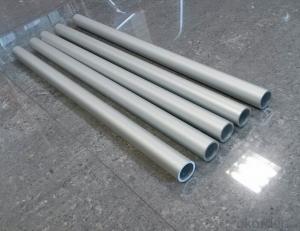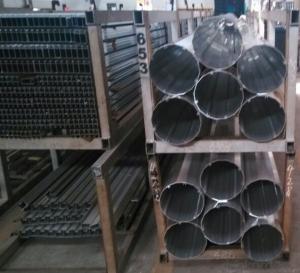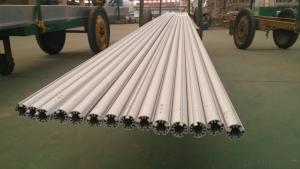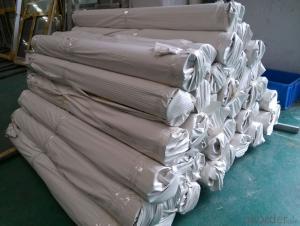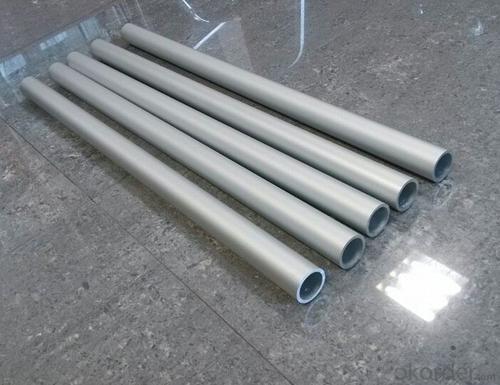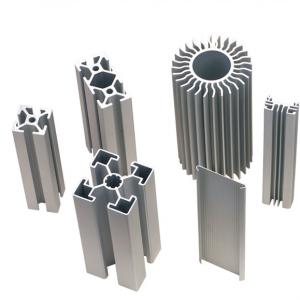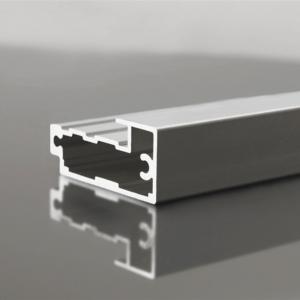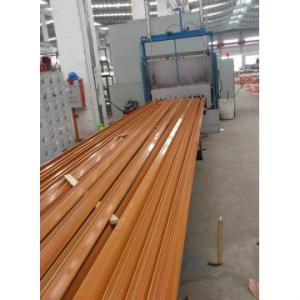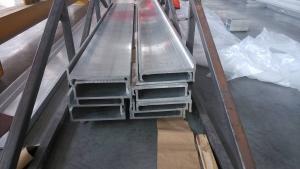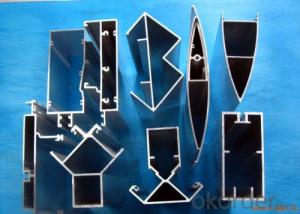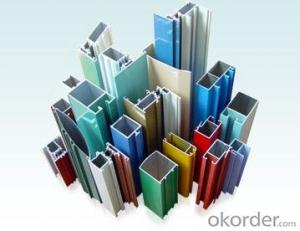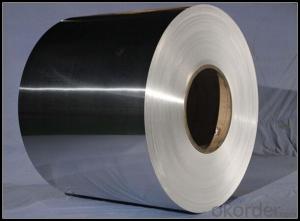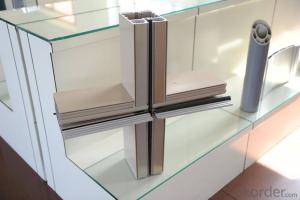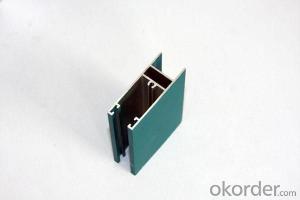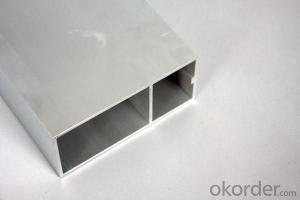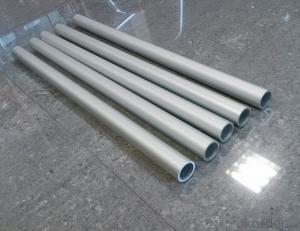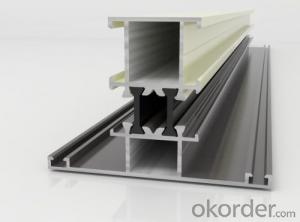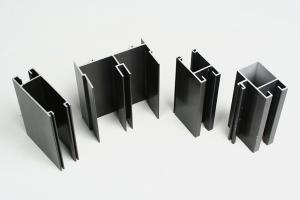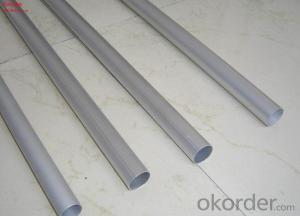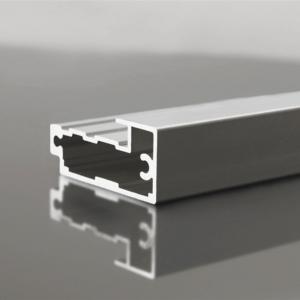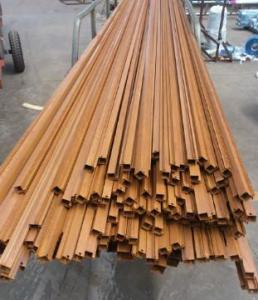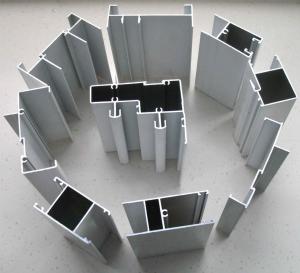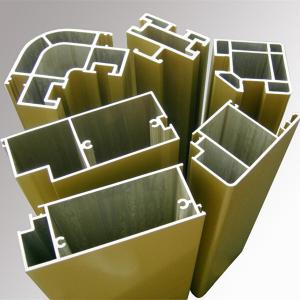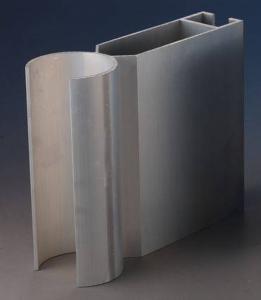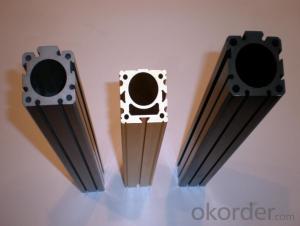China T-One Aluminum Extrusion Profiles - Aluminium Alloy Tube Profile for Furnitures
- Loading Port:
- Shanghai
- Payment Terms:
- TT OR LC
- Min Order Qty:
- 5 m.t.
- Supply Capability:
- 500 m.t./month
OKorder Service Pledge
OKorder Financial Service
You Might Also Like
Products Description
Item | Aluminium Pipe / Aluminum Tube |
Standard | ASTM B209-04,B210M-05,B234M-04,B241-02,B221M-05a, AISI, SUS, EN573-3-2003, JISH4000-2006,H4080-2006, H4040-2006, DIN, GB/T3190-2008,3880.1-2006, 6893-2000,3191-1998,4437.1-2000, ASME,ISO3522-1984 |
ISO ASTM JIS Standard | 1000series:1435,1050,1060,1070,1080,1100,etc |
2000series:2011,2014,2017,2024,etc | |
3000series:3002,3003,3104,3204,3030,etc | |
| 5000series:5005,5025,5052,5040,5056,5083,etc | |
6000series:6101,6003,6061,6063,6020,6201,6262,6082,etc | |
7000series:7003,7005,7050,7075,etc | |
GB Standard | 1A80,1070A,1100,2A01,2014A,1017A,5050,5154A,5083,6161, 7A01,7A52,7075, |
Surface | mill,polished,bright,hair line,brush |
Thickness | 0.5-150mm |
Diameter | 2-2500mm |
Length | 1-12m ,or as required |
Application | 1. Lighting,solar reflector plate. 2.architectural appearance, interior decoration:ceiling,metope, furniture,cabinets and so on. 3.elevator,nameplate, bags. 4.automotive interior and exterior decoration. 5. Interior decoration: such as photo frame. 6.household appliances, refrigerator, microwave oven, audio equipment. 7. Aerospace and military aspects. 8, machinery parts processing, mold manufacturing . 9. chemical/insulation pipeline coating. |
Payment terms | T/T, L/C, and Western Union |
Price terms | FOB CIF CFR CNF etc |
Delivery time | Normally according to the order quantity |
- Q: What unique considerations or criteria must be met when installing aluminum profiles to ensure they are correctly installed?
- <p>Yes, there are special requirements for installing aluminum profiles correctly. These include ensuring the profiles are of the correct size and specifications for the intended application, proper alignment to maintain structural integrity, and secure fastening to prevent movement or damage. Additionally, it's crucial to follow the manufacturer's guidelines for installation, which may include specific torque settings for screws or bolts, and to consider environmental factors such as temperature and humidity that could affect the profile's performance over time. Proper installation also involves checking for any damage or defects in the profiles before installation and ensuring that all components are compatible with each other.</p>
- Q: Can aluminum profiles be used in display shelving and racking systems?
- Yes, aluminum profiles can be used in display shelving and racking systems. Aluminum profiles offer various benefits such as lightweight, durability, and versatility, making them suitable for these applications. They can be easily customized, assembled, and adjusted to meet specific shelving and racking requirements. Additionally, aluminum profiles provide an aesthetically pleasing and modern look to the display shelving and racking systems.
- Q: Shenzhen aluminum profile manufacturers which good?
- How to choose the industrial aluminum profiles, this problem for the just contact with industrial aluminum profile friends, is really a serious problem to consider.That selection of industrial aluminum manufacturers is not good, money, goods is not good, he can give you redo is OK, but also take time; meet industrial aluminum manufacturers some black, and you may be wrangling, that egg pain.
- Q: How do you prevent galvanic corrosion with aluminum profiles?
- To prevent galvanic corrosion with aluminum profiles, several measures can be taken. Firstly, it is essential to ensure that the aluminum profiles are not in direct contact with dissimilar metals, especially those that have a higher electrochemical potential. This can be achieved by using insulating materials, coatings, or gaskets between the aluminum profiles and other metals. Additionally, applying protective coatings or anodizing the aluminum surfaces can provide a barrier against corrosion. Regular maintenance, including cleaning and inspection, is also crucial to identify any potential corrosion risks and address them promptly.
- Q: Are aluminum profiles suitable for escalator handrails?
- Yes, aluminum profiles are suitable for escalator handrails. They are lightweight, durable, and have excellent corrosion resistance, making them an ideal choice for ensuring safe and reliable handrail operation on escalators.
- Q: Light aluminum is what mean?
- Extruded out only through aging treatment, without other surface treatment of aluminum (such as spraying, oxidation and other deep-processing)
- Q: Are aluminum profiles resistant to termites and insects?
- Yes, aluminum profiles are highly resistant to termites and insects. Unlike wood, which is susceptible to termite infestations and insect damage, aluminum is a nonporous material that does not provide a food source for these pests. Additionally, aluminum profiles are typically coated with protective finishes, such as powder coating or anodizing, which further enhance their resistance to termites and insects. This makes aluminum profiles a durable and long-lasting option for various applications, such as window frames, door frames, and other construction projects where termite or insect damage is a concern.
- Q: This question asks for methods to protect aluminum profiles from corrosion and damage during the processes of transportation and storage.
- <p>To prevent corrosion and damage to aluminum profiles during transportation and storage, follow these guidelines: 1. Keep aluminum profiles dry and clean. Moisture and dirt can accelerate corrosion. 2. Use protective packaging, such as plastic wrap or padded covers, to shield profiles from physical damage and moisture. 3. Store profiles in a cool, dry place away from direct sunlight and corrosive substances. 4. Stack profiles with appropriate padding between layers to prevent scratching. 5. Avoid overloading during transportation and ensure secure fastening to prevent movement and potential damage. 6. Regularly inspect stored profiles for signs of corrosion or damage and address any issues promptly.</p>
- Q: This question asks if aluminum profiles can be utilized in the construction of environmentally friendly buildings.
- <p>Yes, aluminum profiles can be used for green building applications. They are valued for their durability, recyclability, and energy efficiency. Aluminum is lightweight, which reduces the building's carbon footprint during transportation. It also has excellent thermal conductivity, allowing for better insulation and energy conservation. Additionally, aluminum can be recycled without losing its properties, contributing to a circular economy and reducing waste. These characteristics make aluminum profiles suitable for sustainable construction practices.</p>
- Q: Are there any limitations or drawbacks of using aluminum profiles?
- Yes, there are limitations and drawbacks to using aluminum profiles. One limitation is that aluminum is not as strong as other metals like steel, so it may not be suitable for applications that require high strength or load-bearing capacities. Additionally, aluminum profiles can be more expensive compared to other materials. They can also be prone to corrosion if not properly protected or coated. Finally, aluminum profiles may have limited design options compared to other materials, potentially restricting the range of shapes and sizes that can be achieved.
Send your message to us
China T-One Aluminum Extrusion Profiles - Aluminium Alloy Tube Profile for Furnitures
- Loading Port:
- Shanghai
- Payment Terms:
- TT OR LC
- Min Order Qty:
- 5 m.t.
- Supply Capability:
- 500 m.t./month
OKorder Service Pledge
OKorder Financial Service
Similar products
Hot products
Hot Searches
Related keywords
